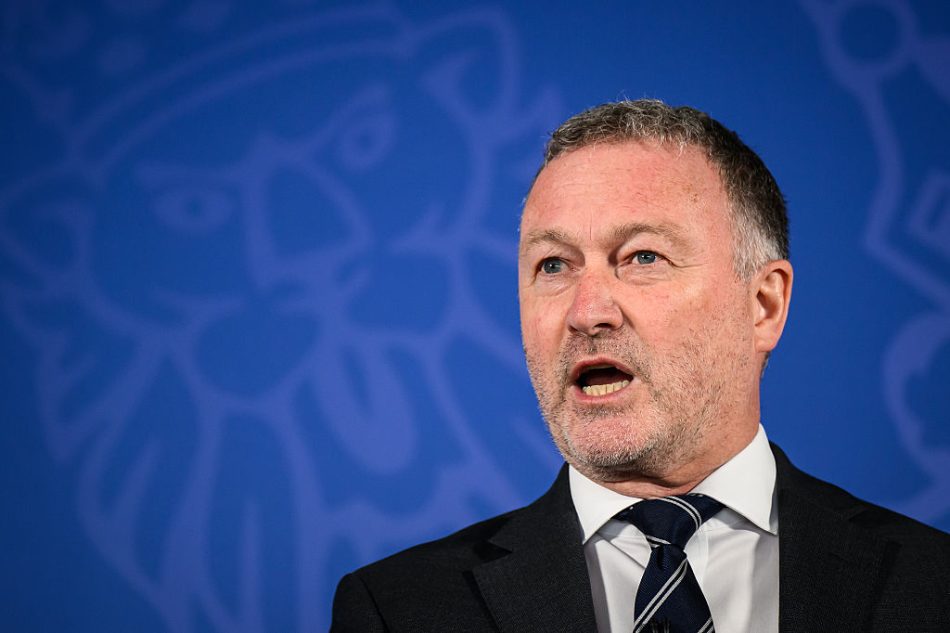After a summer of drift, Labour today launches a fresh fightback against the rise of Reform UK. Leading the charge is Steve Reed, the recently promoted Minister for Housing, Communities and Local Government (MHCLG). In an interview with Michael Gove for The Spectator’s YouTube channel, he explained the thinking behind his department’s new ‘Pride in Place’ programme. A reported £3.4 billion will be pumped into struggling communities over the next decade to try and to resurrect the British high street. You can watch the full interview below.
Reed’s argument is simple: if communities are stronger, they are less likely to turn away from Labour and vote for Reform. ‘Nigel Farage weaponises grievance’, Reed says. ‘He seeks to exacerbate division and trying to divide a community or country is not patriotic.’ Instead, ‘a shared interest in your locality is the bridge that brings people back together.’ His call is one of unity: ‘if we can strengthen those communities, reunite those communities, share prosperity across all of those communities then we can bring the country back together.’
‘A shared interest in your locality is the bridge that brings people back together.’
This will be achieved, he says, by stressing ‘a politics of place’. Reed is a self-described ‘devolution kinda guy.’ As leader of Lambeth Council from 2006 to 2012, he was handed an OBE for helping turn its fortunes around. He wants to ‘give people back the resources and the control that they need to, to change their own areas for the better.’ Local communities rather than ‘me sitting in my rather pleasant office in Marsham Street’ are best placed to make decisions. Today’s announcement, he stresses ‘is a starting point, not an end point… We have to go a lot further because the state of politics right now, the fragmentation of the country requires us to remake politics.’
How though, does that differ from Boris Johnson’s ‘levelling up’ agenda? The Conservative government of 2019 to 2024 ploughed billions into similar schemes. Reed acknowledges the ‘intent’ behind Johnson’s initiative – but suggests that it failed owing to a lack of shared purpose across Whitehall. ‘This has to be something that drives the whole of government’, he argues. Wes Streeting’s ten-year plan is cited as an example: both his plans and Reed’s share an emphasis on neighbourhood delivery. ‘You can start to see how different bits of government are coalescing around this same idea. And I think that makes it bigger than the levelling up agenda.’
‘The fragmentation of the country requires us to remake politics.’
More resources to struggling communities is one thing. But have they got sufficient quality of leadership to put these to best use? ‘We do need better civic leadership across the piece’, Reed admits. He contends that ‘there’s a bit of a brain drain effect going on’, caused by areas being ‘starved’ of talent and investment. It is a similar story with police chiefs, some of whom have been reluctant to clamp down on antisocial behaviour. ‘There’s a mixture of resource and inclination’ says Reed. ‘We have to identify leadership and we have to develop and nurture that talent. And I think it’s something we haven’t done enough over recent years.’
With a difficult Budget looming in October, Rachel Reeves’ fiscal headroom will rely in part on whether she can convince the OBR that 1.5 million new homes will be built this parliament. Reed says he is looking at encouraging brownfield development ‘passports’. He also thinks that there are redundant EU regulations on the statute book, citing one recent example in Oxford where the hibernation of slow worms had impeded new homes. Slow worms ‘are very common [here] but they’re rare in Germany… that kind of regulation, we need to get out of the way.’
Reed’s promotion this month was one of the two most significant moves in the reshuffle. The other was Shabana Mahmood, the new Home Secretary. ‘We’re very close friends’, says Reed ‘She’s invited me round for a curry, so I’m looking forward to that.’ He notes how important the ‘interplay between our roles’ is, citing ‘some of the cohesion issues in communities’ and ‘how policing integrates into tat localisation of power and control.’ Securing the borders and building new homes: Labour’s re-election depends on them both succeeding in their respective roles.







Comments